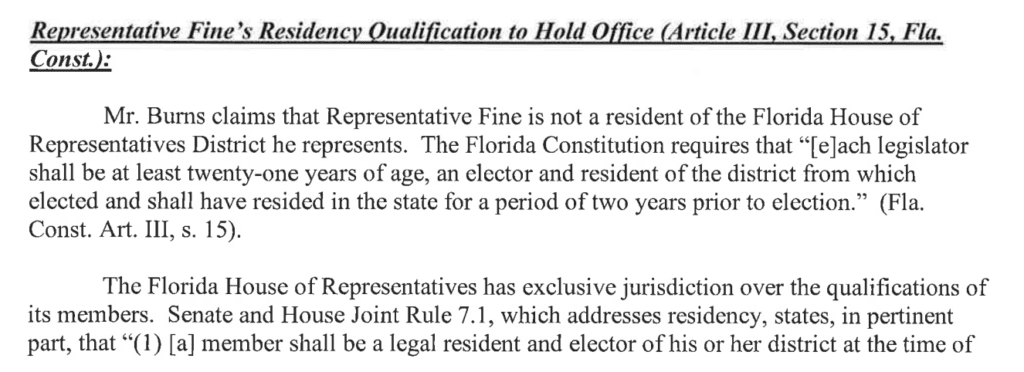An Executive Order signed by the Governor on November 9th this year revealed that there is an ongoing investigation of Brevard County Commissioner John Tobia. The order states, “John Tobia is under investigation for allegations of criminal use of personal identification information and improper voter registration.”
The rest of the order discloses that because of a “working relationship” with the Brevard County Commission, State Attorney Phil Archer voluntarily disqualified himself and requested another State Attorney be assigned to the case in order to avoid a conflict of interest or any appearance of impropriety.
EO-23-217We reached out to Commissioner Tobia for comment.
“I’m thankful our governor takes allegations seriously and ensures they are investigated fully,” he said. “However, this is the third time an opponent or supporter of an opponent has levied similar claims. Each time, an independent body has found no merit, since they were politically motivated. This time is no different, and I’m confident in a positive outcome. I will continue to fight to save our taxpayers money no matter how many elected officials get upset.”
Commissioner Tobia is running for the Brevard County Supervisor of Elections for 2024. He is currently serving his last term as a County Commissioner. He is running against Supervisor of Elections Tim Bobanic, who was appointed to the position last year by Governor DeSantis when then SOE Lori Scott unexpectedly retired.
In September, the County Commission voted to cut funding for the Supervisor of Elections office for spending on sample ballots and return postage for vote-by-mail ballots. The measure, led by Commissioner Tobia, followed the SOE’s office request for a nearly 20% increase in funding during the budgeting process.
The increased scrutiny by the Commission led to some heated meetings between the Commissioners and other offices like the SOE, and the Brevard County Property Appraiser Dana Bickley.
The Commission later reversed the cuts, voting unanimously in a compromised proposal.
According to Tobia, the investigation stems from whether or not he lives in District 3, where he is elected to serve. The County Charter requires that County Commissioners reside in the Districts they serve, and continue to do so throughout their term. State law requires that voters are registered to vote wherever their permanent residence is. The allegations are that Tobia does not live in the district, which he says isn’t the first time he’s faced these accusations.
Residency requirements for elected officials have been an ongoing point of contention in Brevard County and elsewhere. Two years ago, we filed a similar complaint against State Representative Randy Fine, who claimed to live in a small apartment in Palm Bay and not his multi-million-dollar mansion on the beach in Melbourne Beach with the rest of his family. The beach house was not in his district at the time, which if claimed as his residence, would disqualify him from his office as well as mean he was committing voter fraud by voting in a district (Palm Bay) where he does not live. The next year during redistricting, the line for his district was moved to include his beach home, ending with the border literally at the home next to it.
In this case, also against an elected official, State Attorney Phil Archer did not disqualify his office for any of the reasons listed in the above Executive Order. When deciding not to prosecute Representative Fine for voter fraud, he concluded the following:

The specific details of the complaint against Tobia are not publicly known at this time, but one could reasonably assume that they are similar. What is not clear is why State Attorney Archer disqualified himself from one investigation over the other.
A Cape Coral Council member, Patty Cummings, was arrested last month over election charges related to her residency.
Cummings’ warrant reads as follows:
- On or about May 9, 2022, in Lee County, Florida, did unlawfully and knowingly make a false statement, knowingly conceal a material fact, or otherwise commit a fraud in an application for a driver’s license or identification card, contrary to Florida Statute 322.212(5)(a).
- On or about June 14, 2022, in Lee County, Florida, did unlawfully and willfully swear or affirm falsely to an oath or affirmation in connection with or arising out of voting or elections, contrary to Florida Statute 104.011(1).
- On or about November 18, 2022, in Lee County, Florida, did unlawfully and willfully swear or affirm falsely to an oath or affirmation in connection with or arising out of voting or elections, contrary to Florida Statute 104.011(1).
Her case is ongoing.
Most recently, now-retired West Melbourne Mayor Hal Rose faced residency allegations by his fellow council members after he bought a retirement home in Viera, but began leasing a property within West Melbourne to remain qualified for his position. Rose fought the allegations initially, but then later decided to retire from his term early, making the complaint moot.
In 2015, Port Canaveral Commissioner Wayne Justice also faced residency allegations. Commissioner Frank Sullivan filed a lawsuit against Justice, stating that Justice did not meet the residency requirements for the office he was elected to. Sullivan alleged that Justice’s primary residence was in Cocoa Beach, which is Port District 5, rather than District 3, which includes Cocoa and Rockledge.
Justice responded by stating he had two residences: a house in Cocoa Beach and an apartment within the boundaries of District 3.
The 3-judge panel, Circuit Judges David Dugan, Tonya Rainwater, and George Turner, ruled in Justice’s favor in the case, stating, “In this case, the evidence shows the respondent’s intent to make District 3 his residence. In addition, evidence shows the affirmative acts required. The respondent entered into a residential lease within District 3, and changed his voter’s registration and driver’s license to District 3. The law does not require a candidate or official to maintain one exclusive residence. Further, the law does not require the candidate to be always physically at the residence for it to qualify as his residence. The petition … is denied.”
They went on to say, “neither the port charter nor Sullivan provides any assistance in defining what is meant by the term ‘residence.’ The charter is silent, and Sullivan merely argues: ‘You know it when you see it.’”
